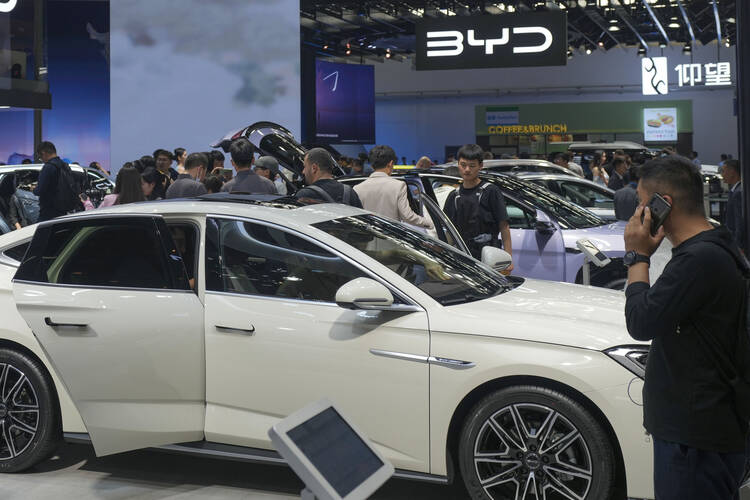In May, President Biden imposed a new round of tariffs on goods from China, including a 100 percent tax on Chinese electric vehicles. Donald Trump, seeking a return to the White House, has proposed a 60 percent tariff on all Chinese goods, part of a larger strategy of ramping up a worldwide trade war. (Kamala Harris, the Democratic nominee for president, has called this “a national sales tax,” but Mr. Trump has said that revenue from the tariff could be used to cut other taxes.)
But is it a good idea for the United States to squeeze China economically at the same time that tensions are increasing between the two nations over Taiwan and the South China Sea? In fact, engaging with each other in commerce and trade may be the best way to avoid armed conflict.
The new trade restrictions are hitting China as it experiences a downward spiral in property prices and faces a recession that may last several years. With falling real estate values, firms and households have less collateral to obtain loans for new investment—which in turn decreases the demand for real estate and leads to further falls in value.
Furthermore, China’s federal and provincial governments obtain much of their revenue from leasing public land to private enterprises. Falling real estate prices force the government to charge less for leasing public properties, therefore shrinking government revenue. This will mean reductions in public spending, particularly in education and social services. Finally, the aging and eventually shrinking population does not augur well for either real estate markets or long-term economic demand, as aging populations tend to save money rather than invest it.
In Japan, the 1990s are known as the “Lost Decade,” when property values plummeted and the economy fell into deflation. While falling prices sound like good news, it means that money (and savings) will further increase in value and people can get higher returns by sitting on their money rather than by investing. Deflation (falling prices) therefore has the same effect as a rise in interest rates, as it chokes off demand and economic activity. This leads to a downward spiral: As people invest less, the real value of money increases still further, producing an even greater incentive to hold on to it. Furthermore, as prices fall, the real value of debt increases, driving firms with otherwise healthy balance sheets into bankruptcy. Such debt-deflation spirals are nasty pieces of work.
The key difference between Japan’s Lost Decade and the current situation in China is that China has been much more innovative. The overall result of the U.S. ban on telecommunication products made by the Chinese company Huawei Technologies, for example, has been to pressure the company to make better products and develop a customer base at home and in countries besides the United States. That is why it is common in China to see Huawei robots handling room service in hotels and setting tables in restaurants.
Another contrast with the Japan of the 1990s is that with the development of low-cost electric cars and low-cost solar panels, China is becoming much more environmentally friendly. It is clearly in the interest of the entire planet to encourage this development. It would be a win-win situation for the United States (and for that matter, the European Union) to lower or eliminate tariffs on these Chinese-made items so that American households and firms can purchase such cost-effective and environmentally friendly goods. In this case, free trade advocates and champions of Pope Francis’ encyclical “Laudato Si’” can be allies, if not friends.
Then there is the geopolitical point of view, which argues that it may be unwise for the United States (and the European Union) to push China to the wall with high import tariffs, or to try to further a financial downturn in that country. Yes, there are very real tensions between China and the United States right now, but the world does not need another outbreak of armed conflict. And it is not a stretch to say that the chances of diplomatic peaceful outcomes are higher between countries when they are enhancing each other’s economic prospects and engaged with one another in commerce and trade.
It is true that importing lower-cost cars and solar panels from places like China will force domestic producers to make adjustments in their own firms, and there will likely be job losses. But rather than try to mitigate job losses through tariffs, a better strategy is for the government to increase subsidies for “green” infrastructure. We should also remember that American automobiles improved in quality when carmakers faced stiff competition from Japanese and German cars, particularly Volkswagen and Toyota, starting in the late 1960s and early 1970s. Why can’t the same scenario play out with solar panels and electric cars from China?
Reducing our tariffs on Chinese exports, particularly solar panels and electric cars, would help mitigate the economic crisis in China, of course. But a move to freer trade would be an environmentally friendly move and would promote world peace. (The challenge of “Laudato Si’,” after all, is to set aside the old ways of doing business and consider the welfare of future generations.) That makes it a winning option for both the United States and China. Let us hope that the next president, whether Ms. Harris or Mr. Trump, will not be seduced by the short-term political gains of higher tariffs.








